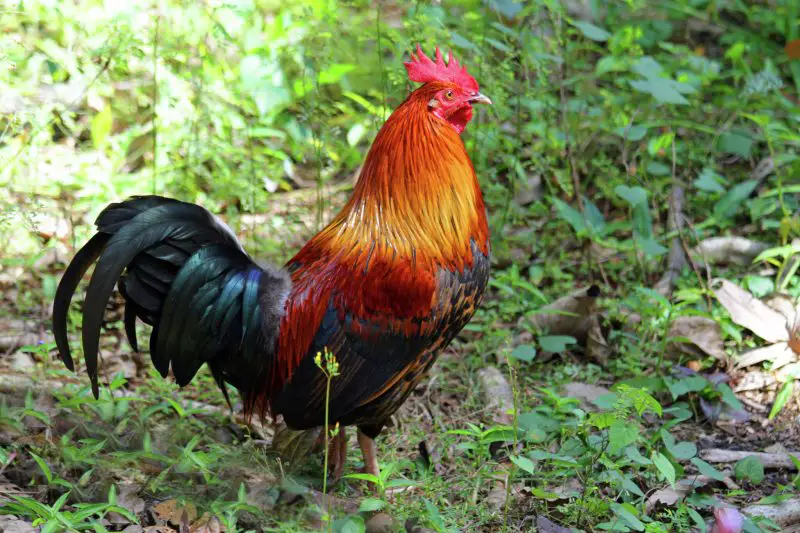Hawaii’s tropical paradise isn’t just home to pristine beaches and breathtaking volcanoes — it’s also home to thousands of feral chickens roaming freely across islands like Oahu, Kauai, Maui, and the Big Island. While locals may find them charming at first glance, their constant crowing, property damage, and public nuisance have sparked an ongoing debate: is it illegal to kill feral chickens in Hawaii by law?
Let’s explore what Hawaii law actually says, how these chickens became wild, what penalties exist, and what legal (and humane) options residents and visitors have to deal with the problem.
Understanding Hawaii’s Feral Chicken Problem

How Did Feral Chickens Appear in Hawaii?
Feral chickens in Hawaii are not native. They are descendants of Red Junglefowl (Gallus gallus) brought by Polynesian settlers centuries ago and domestic chickens that escaped after Hurricanes Iwa (1982) and Iniki (1992). These natural disasters destroyed coops, setting thousands of chickens free.
Over the years, the wild and domestic populations interbred, creating today’s feral chicken population. With no natural predators and plenty of food sources, they multiplied quickly, particularly in residential areas, resorts, and even airports.
Where Are Feral Chickens Most Common?
The island of Kauai has the most visible feral chicken problem. These birds roam parking lots, hotel gardens, and even grocery store entrances. However, feral chickens are found on every island, including Oahu, Maui, and the Big Island.
Tourists often find them amusing — snapping photos and feeding them — while residents find them noisy and destructive. Their early-morning crowing can begin as early as 3 a.m., and they can damage gardens, vehicles, and property.
What the Law Says: Is It Illegal to Kill Feral Chickens in Hawaii?
The Legal Status of Feral Chickens
Under Hawaiian law, feral chickens occupy a gray legal category. They are considered wildlife but also invasive and non-native. That means they are not protected like endangered birds, but you cannot simply kill them at will either.
Each county in Hawaii — such as Honolulu County (Oahu), Kauai County, Maui County, and Hawaii County — has slightly different regulations. However, all generally restrict private individuals from killing or trapping wild animals without authorization or proper methods.
Hawaii Revised Statutes (HRS) Overview
The Hawaii Revised Statutes (HRS) outline that cruelty to animals, including feral chickens, can be punishable under HRS §711-1109, which covers animal cruelty and inhumane treatment. The key factor is intent and method.
Killing feral chickens cruelly or without authorization can be prosecuted. Shooting or poisoning them in public areas is strictly illegal. However, licensed pest control services or government contractors can manage populations under humane guidelines.
County Rules and Local Ordinances
-
Honolulu County (Oahu): It’s illegal to discharge firearms or air guns within city limits, including for chicken control.
-
Kauai County: The county offers programs to trap feral chickens humanely. Unauthorized killing may violate animal cruelty laws.
-
Maui County: Residents can trap nuisance chickens using county-approved methods but cannot kill them cruelly or discharge weapons.
-
Hawaii County (Big Island): The county encourages non-lethal removal and advises contacting animal control or agricultural departments for assistance.
In short: yes, it is illegal to kill feral chickens in Hawaii by law unless you are acting under a licensed wildlife or pest control program.
Why Hawaii Restricts Killing Feral Chickens
1. Ethical and Cultural Reasons
Chickens hold cultural significance in Hawaii. They are tied to Polynesian history, representing early settlers’ relationship with the land. For that reason, many Hawaiians view killing them as disrespectful or unnecessary when humane control methods exist.
2. Safety Concerns
Public safety is another major reason. Discharging firearms or using traps and poisons in residential or tourist areas poses risks to humans, pets, and other wildlife. These areas are densely populated, making lethal methods inappropriate and dangerous.
3. Ecological Considerations
Although invasive, feral chickens now play a small ecological role in seed dispersal and insect control. Sudden eradication efforts could disrupt local ecological balance. Hawaii prefers population management through humane trapping and relocation.
Penalties for Killing Feral Chickens in Hawaii
Criminal Charges
Killing or harming feral chickens without legal authorization can lead to criminal charges under Hawaii’s animal cruelty laws.
- First-degree cruelty (intentional torture or killing): up to 5 years in prison and fines up to $10,000.
- Second-degree cruelty (reckless or negligent killing): up to 1 year in jail and fines up to $2,000.
Civil Penalties
In addition to criminal consequences, violators may face civil penalties or restitution for damages if the act disturbs public property, resorts, or protected areas.
Weapon and Safety Violations
If you use a firearm, air gun, or slingshot in urban or restricted zones, you could face separate charges for illegal weapon discharge, which carry additional fines and possible imprisonment.
Legal and Humane Ways to Deal With Feral Chickens
1. Contact Local Authorities
If you have a chicken problem, report it to your county’s Department of Agriculture or Animal Control Division. They can refer you to licensed professionals authorized to trap or relocate chickens humanely.
2. Humane Trapping
Trapping is the preferred and legal method. Commercial traps are available that allow capture without harm. Once caught, chickens can be surrendered to shelters or farms.
Counties like Kauai and Oahu often have chicken control programs where residents can request help or borrow traps.
3. Exclusion and Deterrents
Property owners can use physical barriers such as fencing or netting to prevent chickens from entering yards or gardens. Motion-activated sprinklers or noise devices can also discourage them from nesting.
4. Stop Feeding Feral Chickens
Feeding wild chickens, while common among tourists, worsens the issue. Counties like Honolulu explicitly prohibit feeding feral animals, as it encourages population growth.
5. Work With Pest Control Professionals
Licensed pest control operators can manage feral chicken populations under strict humane and legal guidelines. These professionals are trained to use approved traps and relocation methods.
Ecological Impact of Feral Chickens in Hawaii
Effects on Native Wildlife
While charming, feral chickens can disrupt Hawaii’s delicate ecosystems. They scratch soil, disturb ground-nesting birds, and may spread parasites that affect native species. Their feeding habits also contribute to erosion in fragile coastal and forest environments.
Impact on Agriculture
Farmers often struggle with chickens digging up seedlings, consuming crops, and spreading weeds. Their droppings can contaminate water sources and transmit Salmonella bacteria, posing public health risks.
Human–Wildlife Conflict
Residents in urban neighborhoods report constant crowing, especially at dawn. Complaints have risen in Honolulu, Kapaa, and Lahaina. Because chickens reproduce quickly — hens can lay 10–15 eggs multiple times per year — their numbers easily spiral out of control.
Feral Chicken Control Programs in Hawaii
County Initiatives
Several Hawaiian counties have introduced chicken control initiatives to reduce populations humanely:
- Kauai County contracts licensed trappers to capture chickens in public spaces.
- Honolulu County launched pilot projects using live traps in parks and schools.
- Maui County partners with agricultural and animal welfare groups for humane removal.
These programs reflect Hawaii’s commitment to balancing cultural respect, environmental protection, and community peace.
Community Involvement
Residents are encouraged to participate by reporting problem areas and avoiding feeding feral birds. Many local organizations hold educational workshops on humane wildlife management.
Tourists and Feral Chickens: What You Should Know
Can Tourists Feed or Touch Them?
While it’s not illegal to observe feral chickens, feeding them is discouraged. Feeding encourages aggressive behavior and increases their dependency on humans. Touching or attempting to catch them can result in scratches or disease exposure.
Are Chickens Protected in Tourist Areas?
In resort zones, chickens are often part of the scenery, but management may work with local authorities to control populations discreetly. Tourists should respect wildlife laws and avoid interfering with traps or nests.
What to Do If Chickens Disturb You
If noisy chickens keep you awake or damage property during your stay, contact your hotel staff or local animal control rather than taking action yourself. Attempting to kill or harm them could result in fines or arrest.
Why Feral Chickens Persist in Hawaii
Ideal Climate and No Natural Predators
Hawaii’s mild, tropical weather allows chickens to breed year-round. Without natural predators like foxes or snakes, their numbers remain unchecked.
Abundant Food Sources
Leftover human food, fruit trees, and open garbage bins provide endless meals. This easy access supports large populations, especially in tourist-heavy areas.
Public Attitudes
While some residents see feral chickens as pests, others see them as harmless island icons. This cultural divide makes large-scale eradication politically and socially difficult.
How Residents Can Help Control Populations
- Keep garbage bins sealed and pet food indoors.
- Avoid feeding chickens or leaving out scraps.
- Report chicken nests near homes or schools.
- Support humane control initiatives and educational programs.
- Encourage responsible tourism practices.
Small community efforts collectively help reduce the spread of feral chickens without resorting to illegal or cruel methods.
Frequently Asked Questions (FAQs)
Is It Legal to Trap Feral Chickens in Hawaii?
Yes, trapping is legal if done humanely and following county guidelines. You cannot harm or kill trapped birds yourself — they must be surrendered to appropriate facilities.
Can I Kill Feral Chickens on My Property?
No, private citizens cannot legally kill feral chickens in Hawaii, even on their property, unless they have special authorization or are acting under a pest control license.
Are There Rewards or Bounties for Chicken Removal?
No official bounty programs exist, but some counties occasionally fund humane trapping programs to help reduce populations in public areas.
Can Feral Chickens Be Eaten?
Technically, yes — if caught and handled safely — but it is not recommended. Feral chickens can carry diseases and parasites, and killing them without authorization remains illegal.
Who Should I Contact for Chicken Problems?
Residents should contact their county Department of Agriculture or animal control for advice on legal removal options.
Conclusion: Respect the Law and the Land
So, is it illegal to kill feral chickens in Hawaii by law?
Yes — it is illegal without proper authorization. Hawaiian law protects even invasive animals from cruelty and unregulated killing. Residents and tourists alike must respect these laws to maintain the islands’ ecological and cultural harmony.
The best way to deal with Hawaii’s feral chickens is through humane, legal, and cooperative efforts — contacting local authorities, using traps responsibly, and avoiding feeding them. While their crowing may be part of Hawaii’s charm to some, understanding the law ensures that everyone, humans and chickens alike, can coexist peacefully on the islands.







Feral chicken report is informative but really does not address the problem of the invasive species on the islands. Our floral and fauna of the islands are often more at risk of being destroyed rather than potected with the presence of the feral chicken.
How do can the community and legislatures commit and come up with a humane effective way of controling the growth of feral chickens? For instances, there are ways of controling feral cats that is supported with funding from the state legislation. We have lost many species on the islands because of neglect.
Last month we were in Kuaui
and saw many feral chickens. We
enjoyed seeing them, as it added to the colorful colors in Hawaii.
Yes their morning crowing was a surprise but you turned over and went back to sleep. It added tranquility to our vacation.
Chickens have made my life a living hell. The roosters screech, not crow, all day and night. Their feces are everywhere in my yard, which is fenced, but they fly in. I have feathers on my screens, they dig holes in my yard. My neighbors throw food everywhere and leave lights on all night.
They are a big problem, particularly on an 8000 sq ft lot. All day, all night, every day, every night.
Eradicate them and require cooping them and not proving lights at night. Mind you, these are pets with names like Halo